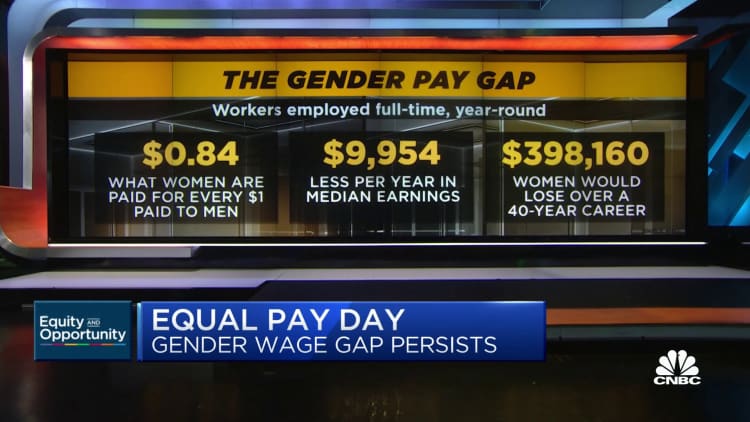Tomasz Szulczewski | Moment | Getty Images
Women continue to make great strides in the workforce, achieving increasing levels of education, and advancing into senior leadership positions. However, the gender pay gap — the difference between the earnings of men and women — has barely budged in recent years.
In the U.S., women who work full time are typically paid about 80 cents for every dollar paid to their male counterparts, nearly the same disparity that existed two decades earlier.
There is no single explanation for why progress toward narrowing the pay gap has stalled, according to a recent report by the Pew Research Center, although women are still more likely to pursue careers in lower-paying industries and take time out of the labor force or reduce the number of hours worked because of caretaking responsibilities — often referred to as the “motherhood penalty.” Systemic bias has also played a role.
In Boston, however, change is happening despite those headwinds.
New research shows the gender wage gap decreased by 30% over the last two years, according to the Boston Women’s Workforce Council, which was formed a decade ago in partnership with the Boston mayor’s office to address this challenge.
To be sure, in Boston, women still only earn 79 cents for every dollar a man earns. However, that marks a 9-cent improvement from the gap reported by the organization in 2021.
“This is the first time we’ve seen a real decrease,” said Kimberly Borman, executive director of the Boston Women’s Workforce Council.
Two factors have helped move the needle, according to the council: Salaries for women overall rose 6% between 2021 and 2023, and more women advanced into higher-paying senior positions.
The council’s annual report also found that the racial/ethnic wage gap did not improve over the same time period. Women of color remain overrepresented in lower-paying industries and positions and rigid workplace practices don’t accommodate for the needs of working parents, the report found, in addition to persistent bias in hiring and promotion practices.
Equal pay for equal work
The council recruits companies in Boston to sign the 100% Talent Compact, a pledge to work toward fixing wage and advancement inequities and a commitment to share their payroll data. More than 250 employers have joined the initiative.
The idea is that pay transparency will bring about pay equity, or essentially equal compensation for work of equal or comparable value, regardless of worker gender, race or other demographic category.

Other cities have reached out in the hope of achieving similar success, but the model may be hard to replicate, Borman said. In Boston, major employers such as MassMutual and Mass General were early co-signers.
“There’s a general feeling among CEOs that this is something that has to be paid attention to,” Borman said.
Those companies have also worked closely with the mayor, she added, noting that “the public and private partnership has helped.”
Equal opportunities for advancement
Going forward, having more women in the C-suite is key to further progress. “There’s a wage gap but there’s also something called a power gap,” Borman said.
Even in a city in which slightly more than half of all professional employees are women, women are often prevented from getting the same opportunities to advance, according to a separate Women in the Workplace study from Lean In and McKinsey.
“We need employers to continue their efforts to address the power gap by advancing women into positions of power, and therefore higher pay, at the same rate as men,” Borman said.
That’s where progress often falls short, the Lean In report found.
“The ‘broken rung’ is the biggest barrier to women’s advancement,” Rachel Thomas, Lean In’s co-founder and CEO, recently told CNBC.
“Companies are effectively leaving women behind from the very beginning of their careers, and women can never catch up,” Thomas said.
Ultimately, that is the biggest obstacle to success. Even moving “closer to equity isn’t enough,” Borman said. “We are working towards complete elimination but it’s going to take promoting women into higher-paying jobs.”

